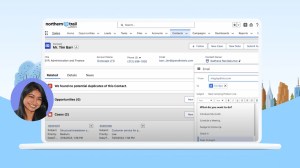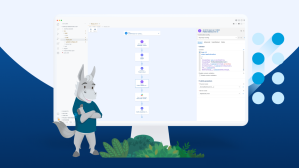To Sanjna Parulekar, who’s spent 10 years in the tech industry and six years on the AI product marketing team at Salesforce, something about the flurry of AI conversations happening these days feels, well, different. “People have now experienced generative AI at their fingertips,” she shared. “So they’re coming to us and asking how to apply it to their business. AI is finally mature enough to make a sizable impact.”
And while Parulekar knows how powerful generative AI can be, she also knows there’s a surprisingly fine line between useful and useless AI output. That difference, she explains, comes down to whether or not an AI-generated response is grounded in the right data, and whether or not users can trust it.
In this interview with Parulekar, we discuss updates to Einstein Copilot that improve enterprise AI output, and how customers can take advantage of out-of-the-box features to get up and running with generative AI right away.
Q. Einstein is a Salesforce staple, embedding AI into the #1 CRM. Now, he’s got a Copilot. What is that, exactly?
Einstein Copilot is a conversational AI assistant that brings the power of generative AI LLMs, like ChatGPT, into Salesforce. Customers can ask questions and Copilot will generate contextualized insights, action plans, and content across various CRM use cases — accomplishing tasks like building digital storefronts, drafting custom code, creating data visualizations, or providing sales associates with recommended steps to close deals.
Customers can choose their preferred LLM within Einstein Copilot, so they can use different models for different use cases. Einstein Copilot is also embedded across every Salesforce cloud, which makes generative AI accessible to anyone that’s using Salesforce technology — within their existing work processes.
Q. What makes Einstein Copilot different?
There is no AI without data, so having AI and data capabilities deeply embedded in our products is super important.
An LLM is only as good as the data it’s trained on. If you ask a public generative AI tool a question about your business, you’re going to run into a few issues. First, the public model doesn’t have your company-specific data, so it lacks the content and context to deliver output that’s personalized and accurate enough to be useful. Second, you don’t want your sensitive company information leaking into these public models, so you need a way to work safely and securely.
With Einstein Copilot, customers get access to advanced and reliable generative AI capabilities, built on the foundation of their trusted enterprise data stored in Salesforce. It integrates with Salesforce Data Cloud, which helps customers unify and harmonize data from any source and then act on relevant data and insights from their existing Salesforce processes and applications. Using both, customers can access all of their data — customer data, telemetry data, Slack conversations, and other structured and unstructured data — to make AI output as relevant as possible.
It’s like writing a paper with access to all the right sources — a subject matter expert, a peer-reviewed paper, and a book.
Q. How does Einstein Copilot build on Salesforce’s data and AI capabilities in the Einstein 1 Platform?
Every time a new technology takes the industry by storm, we update our platform to ensure customers can make the most of that technology within Salesforce.
This year, we added Data Cloud to the Einstein 1 Platform. This helps customers connect massive amounts of data from different systems, giving them the ability to customize data coming from outside Salesforce — like Google Cloud, Amazon, or Snowflake — using our updated metadata framework. By deeply embedding Data Cloud into our platform, we’ve made Data Cloud a much broader application for use cases across sales, service, commerce, and marketing, and enhanced what Einstein Copilot can do.
When we built our predictive AI capabilities with Salesforce Einstein, we created an AI engine inside of Salesforce that enabled us to build and deploy AI to any use case. Adding Einstein Copilot gives customers the competitive edge to deploy predictive and generative AI to make well-informed and accurate decisions about their business.
Q. Trust is Salesforce’s number one value, and it’s a central focus of every product. How does the Einstein Trust Layer keep customer data safe and secure?
The Einstein Trust Layer is a component of our Einstein 1 platform infrastructure that allows us to safely deploy generative AI tools for our customers. It prevents third-party LLM providers from retaining company data, and uses data masking on PII data and payment data for added data privacy. It also incorporates a toxicity score to evaluate the output created by generative AI models, and flags content that’s violent, profane, or hateful.
Salesforce also believes in the importance of humans in the loop. After all, generative AI is a tool meant to make us better at our jobs — to give us the superpower of a helpful co-worker always sitting next to you.
Generative AI is a tool meant to make us better at our jobs — to give us the superpower of a helpful co-worker always sitting next to you.
Q. Salesforce today announced new unstructured data capabilities and Einstein AI Search. How do these capabilities make Einstein Copilot better?
These enhancements are all about giving Einstein Copilot more context. They will improve Einstein Copilot’s ability to understand and process data, and help it understand more complex user queries.
All of this is made possible by something called vector databases, which involves transforming unstructured data, like call notes or a PDF, into a numerical representation called a vector embedding. This makes it easier for an AI system to process the data, compare it against queries, and respond with a useful answer.
And it’s super important because as much as 90% of enterprise data is trapped in unstructured data formats. That’s why we’ve built a vector database natively into Data Cloud. For the first time, Data Cloud will be able to process unstructured data, Einstein Copilot can retrieve that data, and customers can act on that data in Salesforce.
Einstein Copilot Search similarly uses vector embeddings to understand the context behind a prompt or search. Let’s say a customer asks a question like, ‘I recently moved — how do I change the address associated with my credit card?’ This question is turned into an embedding, and compared against the indexed embeddings that represent company data, like knowledge articles. Because these embeddings are numbers, we can use machine learning to understand how related the data is to a customer’s question. Instead of only using keyword search, which would find all stored data that lists ‘credit card,’ Einstein Copilot Search uses semantic search to understand this is a query about payments, and can retrieve the exact information most relevant to the question.
Q. What are some of the easiest ways for customers to get started using Einstein Copilot?
Generative AI is really good at consuming large amounts of information, retrieving it, and generating new content from it quickly, which can help in many different scenarios.
Take sales. With Einstein Copilot, customizing outreach emails to specific customers is faster and more personalized. Einstein Copilot considers the customer’s interaction history, products they’ve purchased, and upcoming marketing events to tailor the email and make it relevant to that customer. This allows sales reps to focus on building relationships and selling, rather than spending excessive time on written customization.
Another is customer service. Many companies maintain a database of knowledge articles that service agents use to respond to customer questions. Finding the right information takes time — time that is especially valuable when a customer is frustrated. Now, service agents can ask Einstein Copilot for help on the case or product, and it can fetch information and give the agent an action plan to close the case. This helps agents deliver faster and more effective customer service, enhancing overall customer satisfaction.
More information
- Dive deeper into Salesforce’s new unstructured data and search capabilities
- Learn about Einstein Copilot
- Find more information on Salesforce Einstein















